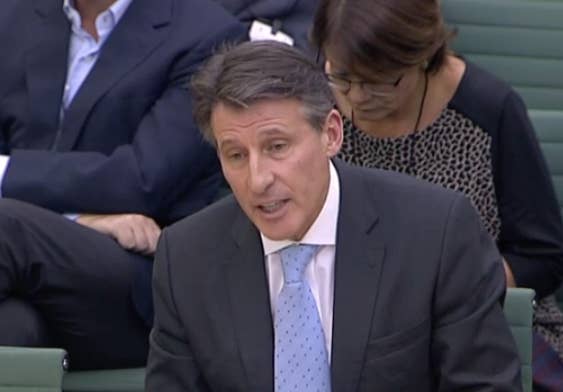Lord Coe, the head of global athletics' governing body, remained defiant on Wednesday as he faced a salvo of questions from MPs on doping in the sport and his personal corporate interests.

Coe, the head of the International Association of Athletics Associations (IAAF), was appearing before the House of Commons' culture, media, and sport select commitee less than a month after a landmark report recommended lifetime bans for five Russian coaches and five Russian athletes who had been doping during major competitions, including the London Olympics.
The World Anti-Doping Agency's (WADA) report painted a bleak picture of the state of world athletics' ability to deal with doping – but Coe remains adamant he is the right man to clean up the sport.
Asked whether he could understand public concern that there may be hundreds of athletes whose doping is yet undiscovered, Coe said: "They are being followed up on. Is one too many? Yes. But do we have a disproportionate amount of damage being done by a relatively low number of countries?"
He said that there had been around 80 prosecutions of athletes showing irregular blood samples since the introduction of the "biological passport" in 2009, an electronic record that can highlight drug use and blood doping.
Coe also revealed he would happily double the IAAF's anti-doping budget of $4 million a year.
He batted away questions about corruption in the sport by repeatedly stressing that cheating athletes would only be allowed back into the sport when they met a strict criteria and the country's governing body could illustrate real change.
Reflecting on his own childhood – Coe first joined an athletics club aged 11 – he said: "If there is a sport that shows that any ambivalence towards doping, parents will find other sports."
Coe was asked why he called allegations from the Sunday Times that the IAAF failed to act on suspicious blood tests a "declaration of war on my sport".
At the time he said: "Nobody should underestimate the anger at the way our sport has been portrayed."
At Wednesdays' hearing he said: "I described the use of selective data against clean athletes. … I don't step back from that. I'm sorry that this mutated into an attack on the media.
"I will die in a ditch for media groups to challenge my motives, but the issue I took exception to was the very selective use of data to prove positive tests.
"I stand by the sentiments but I probably could have chosen different language."
Coe was asked why he hadn't yet met the investigative journalist Hajo Seppelt, who made two documentaries for ARD in 2014 that first alleged widespread doping among Russian athletes and later formed the basis of the WADA investigation.
John Nicolson, the SNP MP for East Dunbartonshire and former TV journalist, said: "If that was me, that would be one the first people I'd want to meet."
Coe – who also denied slamming a phone down when Seppelt called him – replied that by the time the programme was aired there were already IAAF investigations taking place, meaning he couldn't jeopardise those by meeting a journalist.
Coe also explained his decision this week to end a long-running sponsorship deal with Nike, dating back to his days as an 11-time record-breaking long-distance runner, and said he maybe should have left sooner.
Coe asked if he should've ditched Nike sooner: “If I thought the noise would have escalated to the level it did, yes I probably would have."
Coe also faced questions over the decision to award the 2021 World Athletics Championships to Eugene, Oregon, which is close to Nike's headquarters. He defended it as a "strategic decision" despite accusations from committee members that it was influenced by corporate pressure from the sportswear giant.
Coe proved hard to pin down, often answering his own questions, leading to the visible frustration of some committee members.
Does Lord Coe like answering his own rhetorical questions? Yes he does. Is he using this technique to dodge DCMS questions? Yes he is #IAAF.
Coe is chair of the British Olympic Association and widely credited with managing the London 2012 games – an event WADA said had been "sabotaged" by cheating Russian athletes and a complicit Russian athletics federation.
He took over from longstanding IAAF president Lamine Diack in August and praised the Senegalese 82-year-old for his "shrewd stewardship", saying he'd remain the organisation's "spiritual president".
French prosecutors are now pursuing criminal charges against Diack and two others in relation to accusations of bribery.
